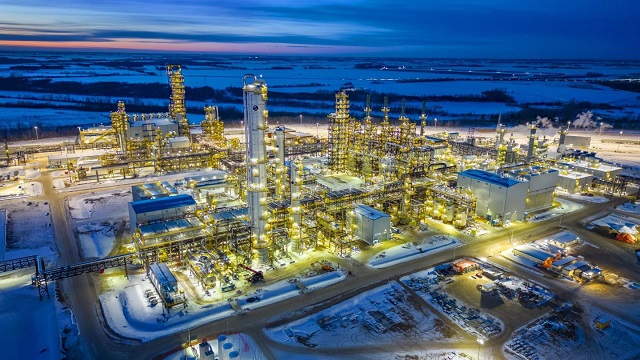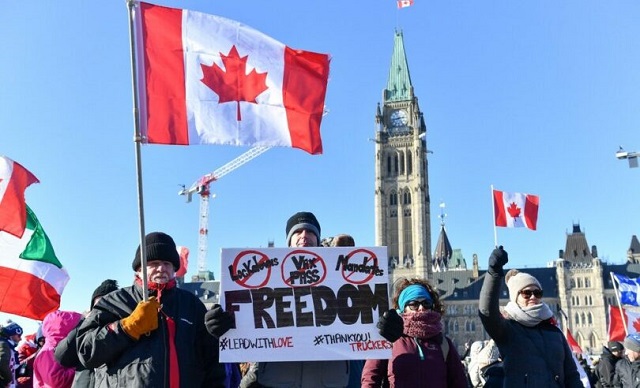Energy
Did the Environment Minister announce the end of Alberta’s Oil and Gas Industry at COP 27?

Steven Guilbeault (center) arrested after climbing the CN Tower for a Greenpeace protest on July 16, 2001.
PHOTO BY AARON HARRIS/THE CANADIAN PRESS
News Release From the Alberta Institute
Stop The Federal Cap On Oil And Gas
This week, Environment and Climate Change Minister, Steven Guilbeault, effectively announced the end of Alberta’s oil and gas industry.
In Egypt, at COP27, he announced that his government will cap oil and gas sector emissions from the end of next year, and work to reduce them after that.
Remember, even Justin Trudeau said that no country would find 173 billion barrels of oil in the ground and just leave them there.
But that, of course, was before he was Prime Minister.
Radical environmental activist Steven Guilbeault does believe we should leave 173 billion barrels of oil in the ground.
Now, yes, technically, he said he would cap and reduce emissions, not oil and gas production, and some energy companies are confident they can find efficiencies to allow them to continue producing some oil and gas without increasing emissions.
But anyone who’s been in the game long enough has seen the goalposts moved often enough to recognize another goalpost shifting when they see it, and that’s exactly what happened today.
How so?
Well, you would think Minister Guilbeault’s friends in the eco-activist industry – the same people who just a few years ago were calling for this cap on emissions – would be happy about this week’s announcement, wouldn’t you?
But no, these same people who were calling for exactly this policy just a few years ago actually attacked his announcement.
They think that this week’s announcement – the policy they were calling for until recently – is woefully inadequate.
They now want, you guessed it, a cap on production.
They don’t actually care about the level of carbon emissions, they don’t actually care whether emissions go down, they want the amount of oil and gas producedto go down.
This, fellow Albertans, is what Alberta is up against.
The radical eco-activist environmental movement doesn’t want Alberta’s oil and gas industry to be more environmentally friendly, they want Alberta’s oil and gas industry to die.
Meanwhile, having shifted the goalposts a dozen times already – the federal government’s environmental policies are as close to a complete ban on oil and gas as you can get, without actually banning it.
One more goalpost shift, and it will be an outright ban.
The environmental groups are pushing for that last final goalpost shift.
And Albertans are just supposed to trust the federal government that, despite all the previous times they shifted the goalposts, this time they definitely won’t.
The time to stand up for Alberta, and stand up for Albertans is now.
If we don’t do so right now, it might be too late.
In the 1980s, Alberta Premier, Peter Lougheed, fought for – and won – an amendment to the Canadian Constitution – Section 92A – that gave Alberta (and the other Provinces) the exclusive right to explore, develop, conserve, and manage their natural resources.
This amendment made clear that these resources belonged to the Provinces, not the federal government, and Alberta would not have signed on to the Constitution had that clause not been included.
Justin Trudeau and Steven Guilbeault do not believe in that clause in the Canadian Constitution.
They have already ignored it many times, and intend to continue to ignore it.
Justin Trudeau’s view is that Alberta can do whatever we want with our resources… as long as whatever we want to do is exactly what the federal government wants us to do.
And the federal Minister of Environment and Climate Change’s view is that we should leave them in the ground – all of them.
Enough is enough.
Now is the time for every Albertan – and the Alberta government – to stand up to the federal government.
If you agree, please join our campaign to stop the federal cap on oil and gas:
Please also consider forwarding this email to your friends, family, colleagues, and every Canadian.
Regards,
The Alberta Institute Team
Alberta
Canada’s advantage as the world’s demand for plastic continues to grow

From the Canadian Energy Centre
By Will Gibson
‘The demand for plastics reflects how essential they are in our lives’
From the clothes on your back to the containers for household products to the pipes and insulation in your home, plastics are interwoven into the fabric of day-to-day life for most Canadians.
And that reliance is projected to grow both in Canada and around the world in the next three decades
The Global Plastics Outlook, published by the Paris-based Organization for Economic Co-operation and Development (OECD), forecasts the use of plastics globally will nearly triple by 2060, driven by economic and population growth.
The use of plastics is projected to double in OECD countries like Canada, the United States and European nations, but the largest increases will take place in Asia and Africa.
“The demand for plastics reflects how essential they are in our lives, whether it is packaging, textiles, building materials or medical equipment,” says Christa Seaman, vice-president, plastics with the Chemical Industry Association of Canada (CIAC), which represents Canada’s plastics producers.
She says as countries look to meet climate and sustainability goals, demand for plastic will grow.
“Plastics in the market today demonstrate their value to our society. Plastics are used to make critical components for solar panels and wind turbines. But they also can play a role in reducing weight in transportation or in ensuring goods that are transported have less weight in their packaging or in their products.”
Canada produces about $35 billion worth of plastic resin and plastic products per year, or over five per cent of Canadian manufacturing sales, according to a 2019 report published by the federal government.
Seaman says Canadian plastic producers have competitive advantages that position them to grow as demand rises at home and abroad. In Alberta, a key opportunity is the abundant supply of natural gas used to make plastic resin.
“As industry and consumer expectations shift for production to reduce emissions, Canada, and particularly Alberta, are extremely well placed to meet increased demand thanks to its supply of low-carbon feedstock. Going forward, production with less emissions is going to be important for companies,” Seaman says.
“You can see that with Dow Chemical’s decision to spend $8.8 billion on a net zero facility in Alberta.”
While modern life would not be possible without plastics, the CIAC says there needs to be better post-use management of plastic products including advanced recycling, or a so-called “circular economy” where plastics are seen as a resource or feedstock for new products, not a waste.
Some companies have already started making significant investments to generate recyclable plastics.
For example, Inter Pipeline Ltd.’s $4.3 billion Heartland Petrochemical Complex near Edmonton started operating in 2023. It produces a recyclable plastic called polypropylene from propane, with 65 per cent lower emissions than the global average thanks to the facility’s integrated design.
Achieving a circular economy – where 90 per cent of post-consumer plastic waste is diverted or recycled – would benefit Canada’s economy, according to the CIAC.
A Deloitte study, commissioned by Environment & Climate Change Canada, estimated diverting or reusing 90 per cent of post-consumer plastic waste by 2030 will save $500 million annually while creating 42,000 direct and indirect jobs. It would also cut Canada’s annual CO2 emissions by 1.8 megatonnes.
Right now, about 85 per cent of plastics end up in Canada’s landfills. To reach the 90 per cent diversion rate, Seaman says Canada must improve its infrastructure to collect and process the plastic waste currently being landfilled.
But she also says the industry rather than municipalities need to take responsibility for recycling plastic waste.
“This concept is referred to as extended producer responsibility. Municipalities have the responsibility for managing recycling within a waste management system. Given the competing costs and priorities, they don’t have the incentive to invest into recycling infrastructure when landfill space was the most cost-effective solution for them,” she says.
“Putting that responsibility on the producers who put the products on the market makes the most sense…The industry is adapting, and we hope government policy will recognize this opportunity for Canada to meet our climate goals while growing our economy.”
Economy
Extreme Weather and Climate Change

From the Fraser Insitute
Contrary to claims by many climate activists and politicians, extreme weather events—including forest fires, droughts, floods and hurricanes—are not increasing in frequency or intensity, finds a new study published today by the Fraser Institute, an independent, non-partisan Canadian public policy think-tank.
“Earth Day has become a time when extraordinary claims are made about extreme weather events, but before policymakers act on those extreme claims—often with harmful regulations—it’s important to study the actual evidence,” said Kenneth Green, a senior fellow with the Fraser Institute and author of Extreme Weather and Climate Change.
The study finds that global temperatures have increased moderately since 1950 but there is no evidence that extreme weather events are on the rise, including:
• Drought: Data from the World Meteorological Organization Standardized Precipitation Index showed no statistically significant trends in drought duration or magnitude—with the exception of some small regions in Africa and South America—from 1900 to 2020.
• Flooding: Research in the Journal of Hydrology in 2017, analyzing 9,213 recording stations around the world, found there were more stations exhibiting significant decreasing trends (in flood risk) than increasing trends.
• Hurricanes: Research conducted for the World Meteorological Organization in 2019 (updated in 2023) found no long-term trends in hurricanes or major hurricanes recorded globally going back to 1980.
• Forest Fires: The Royal Society in London, in 2020, found that when considering the total area burned at the global level, there is no overall increase, but rather a decline over the last decades. In Canada, data from Canada’s Wildland Fire Information System show that the number of fires and the area burned in Canada have both been declining over the past 30 years.
“The evidence is clear—many of the claims that extreme weather events are increasing are simply not empirically true,” Green said.
“Before governments impose new regulations or enact new programs, they need to study the actual data and base their actions on facts, not unsubstantiated claims.”
- Assertions are made claiming that weather extremes are increasing in frequency and severity, spurred on by humanity’s greenhouse gas emissions.
- Based on such assertions, governments are enacting ever more restrictive regulations on Canadian consumers of energy products, and especially Canada’s energy sector. These regulations impose significant costs on the Canadian economy, and can exert downward pressure on Canadian’s standard of living.
- According to the UN IPCC, evidence does suggest that some types of extreme weather have become more extreme, particularly those relating to temperature trends.
- However, many types of extreme weather show no signs of increasing and in some cases are decreasing. Drought has shown no clear increasing trend, nor has flooding. Hurricane intensity and number show no increasing trend. Globally, wildfires have shown no clear trend in increasing number or intensity, while in Canada, wildfires have actually been decreasing in number and areas consumed from the 1950s to the present.
- While media and political activists assert that the evidence for increasing harms from increasing extreme weather is iron-clad, it is anything but. In fact, it is quite limited, and of low reliability. Claims about extreme weather should not be used as the basis for committing to long-term regulatory regimes that will hurt current Canadian standards of living, and leave future generations worse off.
Author:
The Fraser Institute is an independent Canadian public policy research and educational
organization with offices in Vancouver, Calgary, Toronto, and Montreal and ties to a global
network of think-tanks in 87 countries. Its mission is to improve the quality of life for Canadians,
their families and future generations by studying, measuring and broadly communicating the
effects of government policies, entrepreneurship and choice on their well-being. To protect the
Institute’s independence, it does not accept grants from governments or contracts for research.
Visit www.fraserinstitute.org
-

 Economy2 days ago
Economy2 days agoExtreme Weather and Climate Change
-

 International2 days ago
International2 days agoTelegram founder tells Tucker Carlson that US intel agents tried to spy on user messages
-

 Alberta2 days ago
Alberta2 days agoDanielle Smith warns arsonists who start wildfires in Alberta that they will be held accountable
-

 National2 days ago
National2 days agoCanada’s Governor General slammed for hosting partisan event promoting Trudeau’s ‘hate speech’ bill
-

 Business2 days ago
Business2 days agoNew capital gains hike won’t work as claimed but will harm the economy
-

 Bruce Dowbiggin1 day ago
Bruce Dowbiggin1 day agoWhy Are Canadian Mayors So Far Left And Out Of Touch?
-

 Justice1 day ago
Justice1 day agoOntario Court of Justice says participants must state their ‘preferred pronouns’ during introduction
-

 Business1 day ago
Business1 day agoTrudeau gov’t pledges $42 million to the CBC to promote ‘independent journalism’








